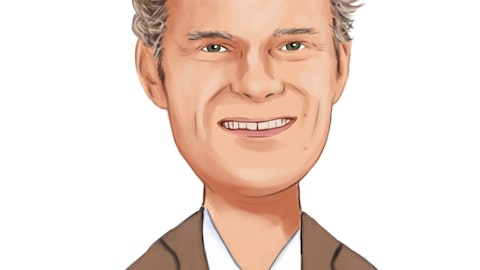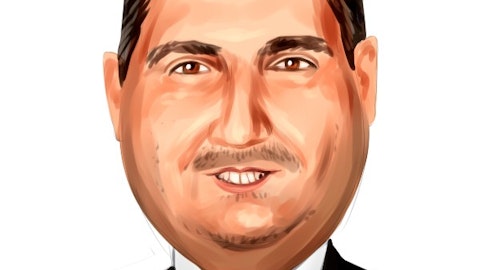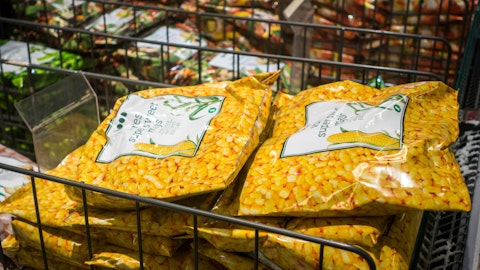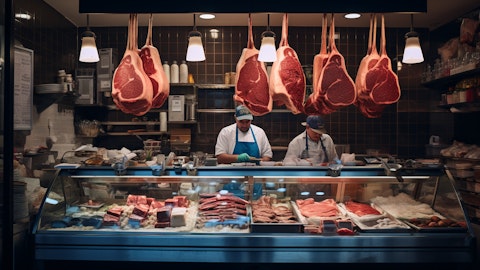We think that the gross profit that we continue to grow year after year after year through the actions that we’re driving from our initiatives that we think they’re still a runway there over the course of 2024. So I’m not going to give you a specific magnitude but clearly, we do expect that to grow faster than OpEx.
Operator: Your next question comes from the line of Jeffrey Bernstein with Barclays.
Jeffrey Bernstein: Great. Two questions. The first one, just on the invested EBITDA, Dave, I think you mentioned or maybe you gave a little teaser ahead of the June Investor Day. But you put you’d grow adjusted EBITDA in the high single digit to low double-digit range the next several years. the low double digit was of our expectation. I know consensus is in kind of that 7% to 8% range. But just wondering if you could talk a little bit about the biggest driver of that potential growth acceleration. Whether or not it’s more from upside to sales or whether you have increasing confidence or greater confidence in the margin opportunity that would allow you to get into that north of single-digit range? And then, I have one follow-up.
David Flitman: Well, first of all, I’ll say we’ll say a lot more about all that up in June. But having said that, I think what you’ve seen us deliver, particularly in 2023 was a great balance in our P&L. We’ve got very good top line growth. We’re leveraging that quite well based on some of the comments you heard from Dirk and our control of operating expenses. We’re leveraging that quite well through the P&L. And so that model is working quite well for us. I’m excited about our top line growth, we’re investing in the right areas, both to drive top line growth and continue to drive productivity and efficiency in the business. And I think that will continue for a long time to come. So think balance, I think just equal opportunity in the top line as well as the leverage areas of GP and expense control.
Jeffrey Bernstein: Understood. And then, just a follow-up. I wanted because you talked about well, the very strong EBITDA margin expansion of, I think it was 50-plus basis points in 2023. I just think about that expansion in 2024 and longer term, I know you talked about supply chain being perhaps the lagging factor. But should we assume steady increases kind of in the theme of what you just said balanced? Or is it more lumpy? I’m just wondering if could prioritize the greatest opportunities to drive that EBITDA margin expansion.
Dirk Locascio: I think steadier would be a better way to mention about it versus one. Obviously, every quarter is the same winning [ph] is the right way to think about it. And we’ve demonstrated that ability to drive the leverage with a couple of pandemic and post years aside for a long time. And so it may not be at the 50 basis points but we think there’s still plenty of room for year-after-year opportunity for margin expansion.
Operator: Your next question comes from the line of Mark Carden with UBS.
Mark Carden: So to start, you guys talked a bit about your expansion of Pronto and that you’re now in 35 markets today. when you guys add Pronto to a new market, is the vast majority of the independent case growth lift capture in year 1? Do you see much of a waterfall benefit there? And then just more broadly speaking, what inning do you think you’re in for the initiative before its maturity?
David Flitman: Great question. We’re excited about Pronto, where we penetrated the market with that. We see a great uplift in independent growth, particularly with new customers there. and that comes fairly early. It gives us additional tool in our tool kit to service customers, particularly in those dense geographies where it’s hard to get to or they may need more frequent deliveries than we do with our larger deliveries. I would say we’re not mature in that yet but we’ve got 5 more markets we’re going to penetrate this year. I will say that not all markets are right for Pronto, particularly those larger dense geography markets make the most sense. We still have plenty of opportunity there. And I’d be remiss to not reiterate that we see plenty of growth where we’ve already penetrated the market with Pronto and continue to add new trucks and capabilities there where we’ve had success.
So I see probably an equal balance for new market penetration as well as existing market growth.
Mark Carden: Got it, that’s helpful. And then as a follow-up, how are you guys thinking about the labor environment in the year ahead? You gave some really helpful color about the recent strike. Your largest competitor had a few of these as well in recent years. Has there been any underlying changes here? Or do you see it just being more or less of a nice issue?
David Flitman: Yes. We see this as an isolated issue. We pride ourselves on having very strong relations with our associates, whether they’re represented or not. We’ve got a long history of reaching positive win-win outcomes with our labor unions across the country. We had a disruption. And as I said, we’re well prepared for it. We got through it in a few weeks and settled largely on the offer that we put forward at the end of last year. So those things come and go over time. You don’t expect them to happen but you need to be planned and ready for it and we were. We’ve got a number, just like we do every year, we’ve got a number of new agreements that are up for negotiations this year and we expect those to go well.
Operator: Your next question comes from the line of John Ivankoe with JPMorgan.
John Ivankoe: Maybe your fourth quarter results and your overall ’23 results speak to this but just want to get a sense of the underlying health of the independent restaurant segment. There has been I mean, I think some debate or discussion in terms of whether this is actually still a growing industry and the fundamentals are still positive for independent restaurants to put new capital in the ground and for them to get new capital in the ground as we kind of think about ’24 — in the ’25 but let’s just focus on ’24. So as you talk to your territory managers, what are they telling you about this important addressable customer set? Are they seeing even more sales opportunities out there relative to what you’re currently serving?
David Flitman: Yes. They are excited about it. I’m excited about it. I think the healthy operator is really strong. I think there’s been a nice recovery since the pandemic in terms of actual units that have come back online or new restaurants. But importantly, the thing that I always tell our team, even given the health of the industry, it’s going to ebb and flow, we think it’s very robust right now. But we have ample share gain opportunities regardless of what’s going on with the macro. And let’s stay focused on the things we can control, our model works, our team-based selling model works. We have great products and services for our customers. And let’s not look left or right, let’s just stay focused on running our plays that are working. And I think we’ve got a long runway of growth ahead of us.
Operator: [Operator Instructions] Your next question comes from the line of Andrew Wolf with CL King.
Andrew Wolf: Dave, you’ve consistently kind of emphasized worker safety, almost like a mantra. I was kind of wondering given your experience, not just in this industry but others, have you — is there a correlation between improved safety and other key metrics across the enterprise more broadly, productivity, on time, et cetera? I mean I’m just trying to get to the bottom of why you lead with workers.
David Flitman: Well, the reason I lead with it is it’s the right thing to do for our associates and for our company. And I say this all the time to our team Andy, if we can’t keep our people safe working for us every day, then nothing else we’re going to accomplish matters. I’m that passionate about it. And when I got here, we didn’t have actually the focus I felt we needed on safety and that’s why I’m so excited about our 23% improvement last year. We will continue to focus on it because it’s the right thing. Now having said that, to your question, Yes. I think safety performance is a good indicator of overall operating discipline that you have in areas like quality, productivity, how you think about the customer. I worked with DuPont for 20 years, you might remember.
And I used to be able to walk into an operation and just observe and look around. And if I saw a good housekeeping and safety behavior you can kind of get a good sense for how that operation was run top to bottom. So it’s the right thing for our people. It’s the right thing for our company and for our business and we’ll stay focused on it.
Andrew Wolf: Okay, that’s good color. Appreciate it. And just a last follow-up on the sales compensation changes. You’ve had a bunch of questions but do you think having an untapped compensation can help you recruit better or territory managers? Is there a recruitment advantage to that? Or more of a…
David Flitman: I think it will be. That’s not really the driver of it. But I think folks coming in from the outside that are hungry great salespeople and we tell them that that’s the way the comp is structured. I think that will be a real benefit. We just want to [indiscernible] our folks in the right way to drive as much profitable growth as they can for themselves and for the company and we thought that made sense.
Operator: I will now turn the call back over to Dave Flitman for closing remarks. Please go ahead.
David Flitman: Thank you and thank you all for joining us today. We have very strong momentum in our business. We’re excited about the future. We look forward to seeing all of you on June 5, we’ll talk before then. Have a great rest of the week.
Operator: Ladies and gentlemen, that concludes today’s call. Thank you all for joining and you may now disconnect your lines.
Follow Us Foods Holding Corp. (NYSE:USFD)
Follow Us Foods Holding Corp. (NYSE:USFD)
Receive real-time insider trading and news alerts





